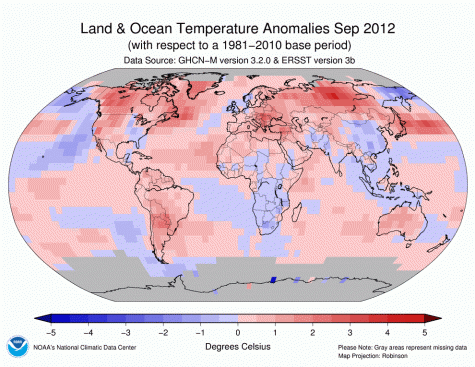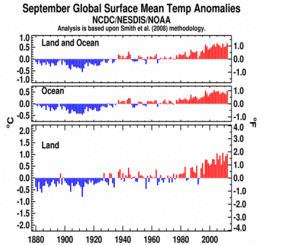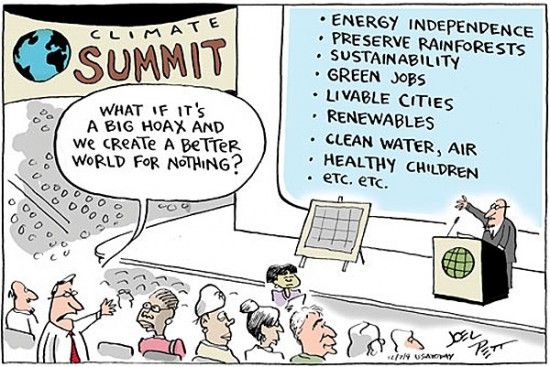Andrew Freedman reports the Globe Records Warmest September on Record NOAA Says, just in time for a hot potential debate question tonight.
According to data from the National Oceanic and Atmospheric Administration (NOAA), the globe recorded its warmest September on record, tying with 2005 for the title. Global surface temperature records stretch all the way back to 1880. September marked the 331st straight month with above-average temperatures, and the 36th straight September with a global temperature above the 20th-century average.
 Credit: NOAA Global Temperature Anomalies
Credit: NOAA Global Temperature Anomalies
The trends in global warming have become well established and accepted within the scientific community. Freedman asserts the last time the globe showed a below average September for temperatures was 1976. Also, the U.S. is on track to have the warmest year on record.
One can see compelling trends in this data going back to 1880, despite the somewhat blurry enlargement.

Global land temperatures were the third warmest on record for September, while sea surface temperatures tied with 1997 as the second highest on record, NOAA found. The combined land and ocean average temperature was 1.21°F above the 20th-century average. ...
The U.S. continued to suffer from one of its worst droughts on record, with the majority of the contiguous U.S. seeing some form of drought conditions during the month. In addition, eastern Europe, inclduing Bulgaria, Hungary, Poland, and Romania, suffered from drought conditions. In India, unusually dry weather was ameliorated when the Asian monsoon finally provided generous rains, albeit much later than average.
September also brought the lowest Arctic sea ice extent on record. Studies have shown that manmade global warming is the cause of the majority of sea ice loss that has occurred since the beginning of the satellite record in 1979. More than 4.57 million square miles of ice melted in 2012, NOAA said, which is the size of the entire U.S. and Mexico combined. The six lowest sea ice extents have all occurred in the past six years, a sign of the rapid disappearance of summer sea ice in the Far North, a development that may have far-reaching implications for weather patterns in the northern hemisphere in particular.
And, directly from the NOAA Website
Global Highlights
The average combined global land and ocean surface temperature for September 2012 tied with 2005 as the warmest September on record, at 0.67°C (1.21°F) above the 20th century average of 15.0°C (59.0°F). Records began in 1880.
The globally-averaged land surface temperature for September 2012 was the third warmest September on record, at 1.02°C (1.84°F) above average. The globally-averaged ocean surface temperature tied with 1997 as the second warmest September on record, at 0.54°C (0.97°F) above average.
The average combined global land and ocean surface temperature for January–September 2012 was the eighth warmest such period on record, at 0.57°C (1.03°F) above the 20th century average.
The tragic impact of global warming on food production, habitat loss, storm variability, the rise of sea levels, and coastal erosion seems to be occurring faster than our worst-case projections even just five years ago. Over the next half century, we will need unprecedented global cooperation to deal with growing numbers of environmental refugees. The Republican Party appears to be exceptionally ill-suited to this task, with some of them still advocating disbanding the UN, and other global institutions.
And, my understanding is that due to long-delays in the degradation of atmospheric pollutants, even if we were to organize some implausible, extra-ordinary, global remediation response it could be decades, if not half a century, of worsening conditions before any improvements are even possible.
Despite the depressing nature of these developments, perhaps you will permit me to poke a bit of ridicule to the climate deniers who object to and are blocking efforts to improve our situation, with this cartoon.



